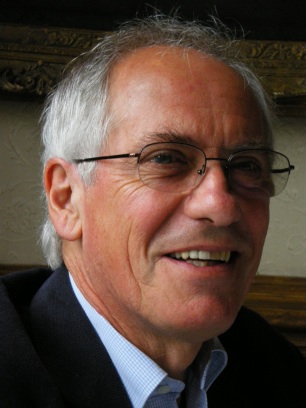The Association for Computing Machinery (ACM) is a US-based international learned society for computing. It was founded in 1947 and is the world's largest scientific and educational computing society. The ACM is a non-profit professional membership group, reporting nearly 110,000 student and professional members as of 2022. Its headquarters are in New York City.

Sir Charles Antony Richard Hoare is a British computer scientist who has made foundational contributions to programming languages, algorithms, operating systems, formal verification, and concurrent computing. His work earned him the Turing Award, usually regarded as the highest distinction in computer science, in 1980.
Axiom is a free, general-purpose computer algebra system. It consists of an interpreter environment, a compiler and a library, which defines a strongly typed hierarchy.

The Department of Computer Science and Technology, formerly the Computer Laboratory, is the computer science department of the University of Cambridge. As of 2023 it employed 56 faculty members, 45 support staff, 105 research staff, and about 205 research students. The current Head of Department is Professor Alastair Beresford.

Christopher S. Strachey was a British computer scientist. He was one of the founders of denotational semantics, and a pioneer in programming language design and computer time-sharing. He has also been credited as possibly being the first developer of a video game. He was a member of the Strachey family, prominent in government, arts, administration, and academia.
Hope is a small functional programming language developed in the 1970s at the University of Edinburgh. It predates Miranda and Haskell and is contemporaneous with ML, also developed at the University. Hope was derived from NPL, a simple functional language developed by Rod Burstall and John Darlington in their work on program transformation. NPL and Hope are notable for being the first languages with call-by-pattern evaluation and algebraic data types.

Ben Shneiderman is an American computer scientist, a Distinguished University Professor in the University of Maryland Department of Computer Science, which is part of the University of Maryland College of Computer, Mathematical, and Natural Sciences at the University of Maryland, College Park, and the founding director (1983-2000) of the University of Maryland Human-Computer Interaction Lab. He conducted fundamental research in the field of human–computer interaction, developing new ideas, methods, and tools such as the direct manipulation interface, and his eight rules of design.

The Department of Computer Science is the computer science department of the University of Oxford, England, which is part of the university's Mathematical, Physical and Life Sciences Division. It was founded in 1957 as the Computing Laboratory. By 2014 the staff count was 52 members of academic staff and over 80 research staff. The 2019, 2020 and 2021 Times World University Subject Rankings places Oxford University 1st in the world for Computer Science. Oxford University is also the top university for computer science in the UK and Europe according to Business Insider. The 2020 QS University Subject Rankings places The University of Oxford 5th in the world for Computer Science.

John Charles Reynolds was an American computer scientist.

Philip Lee Wadler is a UK-based American computer scientist known for his contributions to programming language design and type theory. He is the chair of theoretical computer science at the Laboratory for Foundations of Computer Science at the School of Informatics, University of Edinburgh. He has contributed to the theory behind functional programming and the use of monads; and the designs of the purely functional language Haskell and the XQuery declarative query language. In 1984, he created the Orwell language. Wadler was involved in adding generic types to Java 5.0. He is also author of "Theorems for free!", a paper that gave rise to much research on functional language optimization.

Lawrence Charles Paulson is an American computer scientist. He is a Professor of Computational Logic at the University of Cambridge Computer Laboratory and a Fellow of Clare College, Cambridge.

Richard Simpson Bird was an English computer scientist.

Programming language theory (PLT) is a branch of computer science that deals with the design, implementation, analysis, characterization, and classification of formal languages known as programming languages. Programming language theory is closely related to other fields including mathematics, software engineering, and linguistics. There are a number of academic conferences and journals in the area.

Luca Andrea Cardelli is an Italian computer scientist who is a research professor at the University of Oxford, UK. Cardelli is well known for his research in type theory and operational semantics. Among other contributions, in programming languages, he helped design the language Modula-3, implemented the first compiler for the (non-pure) functional language ML, defined the concept of typeful programming, and helped develop the experimental language Polyphonic C#.
Bluespec, Inc. is an American semiconductor tool design company co-founded by Massachusetts Institute of Technology (MIT) professor Arvind in June 2003 and based in Framingham, Massachusetts. Arvind had formerly founded Sandburst in 2000, which specialized in producing chips for 10 Gigabit Ethernet (10GE) routers, for this task. Bluespec has two product lines which are primarily for application-specific integrated circuit (ASIC) and field-programmable gate array (FPGA) hardware designers and architects. Bluespec supplies high-level synthesis with register-transfer level (RTL). The first Bluespec workshop was held on August 13, 2007, at MIT.
Rodney Martineau "Rod" Burstall FRSE is a British computer scientist and one of four founders of the Laboratory for Foundations of Computer Science at the University of Edinburgh.
Arvind is the Johnson Professor of Computer Science and Engineering in the Computer Science and Artificial Intelligence Laboratory (CSAIL) at the Massachusetts Institute of Technology (MIT). He is a Fellow of the Institute of Electrical and Electronics Engineers (IEEE) and the Association for Computing Machinery (ACM). He was also elected as a member into the National Academy of Engineering in 2008 for contributions to dataflow and multithread computing and the development of tools for the high-level synthesis of digital electronics hardware.

Georg Gottlob FRS is an Austrian-Italian computer scientist who works in the areas of database theory, logic, and artificial intelligence and is Professor of Informatics at the University of Calabria. He was Professor at the University of Oxford.
Haskell is a general-purpose, statically-typed, purely functional programming language with type inference and lazy evaluation. Designed for teaching, research, and industrial applications, Haskell has pioneered a number of programming language features such as type classes, which enable type-safe operator overloading, and monadic input/output (IO). It is named after logician Haskell Curry. Haskell's main implementation is the Glasgow Haskell Compiler (GHC).
Thoth is a real-time, message passing operating system (OS) developed at the University of Waterloo in Waterloo, Ontario Canada.










